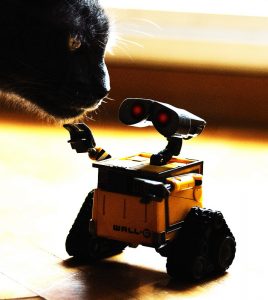When I tell people about my studies in the LIS field, I often hear a few similar responses:
- “Oh, do they still need librarians with Google and ebooks around?” (Short answer: “Yes, of course!” Longer answer: “Library and information science is about more than searching Google and checking out books!” Longest answer: Well, perhaps you should just email me.)
- “What can you do with that?” (Answer: “What can’t I do with that?”)
- “Let me guess: you want to be a librarian because you like books, right?”

Photo credit: Neticola via Foter.com / CC BY-ND
To be honest, that last question really needs a longer answer, so here we go. I can’t deny that I love books or that I always have. I often joke that I’m a nerdy geek, because of my love of literature and science and math in addition to my absolute devotion to facts and information. I’m currently cataloging my own collection of books on LibraryThing, so I can have a better accounting of what we actually own (and probably so I can get an insurance rider for my books. I…might have quite a lot of them). So, yes, of course I like books.
But that isn’t the reason I’m interested in the LIS field. You want to know the secret about most people who end up with an MLIS? They don’t usually go into the field for the books. No, it’s what’s inside those books that makes all the difference to those of us in LIS.
We’re interested in information. To put it plainly, we’re as curious as that unmoving cat over there. (Don’t worry: he’s just stunned.) Too often, people give up on finding an answer before they even start. Worse, they sometimes don’t even know that they might be able to solve their own problem. Librarians, however? We know. We know that if we just find the right combination of words and phrases, we can fix that weird computer error or figure out why something doesn’t work the way we think it should. We put together the why and how and become fixers and problem solvers.
We should be, anyway. I’m sure we’ve all encountered educators or librarians who don’t know and don’t care to know, who have no innate curiosity or compelling desire to be lifelong learners. I don’t understand this mental hang-up, and it’s something I’ve struggled with seeing in fellow LIS students. I recently formulated a Statement of Professional Philosophy, wherein I declared the three most important aspects of a librarian to be empathy, inclusivity, and (of course) curiosity. In my professional philosophy, I included the following exhortation:
How anyone could become a librarian without having an indefatigable sense of curiosity and an overwhelming urge to always be learning is incomprehensible to me. From the time I was a young child, I have been curious about how things work and how to help things work better. I am quite lucky that my parents allowed and cultivated this sense of curiosity by allowing me to take things apart, put things together, and read whatever I could get my hands on. Curiosity is one of the essential traits that all information professionals must have and must continue to cultivate throughout their lives.
We information professionals should be seeking curiosity in its many incarnations. Education never stops, and reading is an important part of this ongoing, adult education. Technology is changing at a rapid pace, and emerging technologies are coming along quickly. Asking ourselves questions and being able to find the answers quickly and efficiently will only allow us to learn more and to help others learn as well. If we aren’t curious and aren’t willing to ask questions and to seek the answers, how can we expect our patrons and users to do so?

I wish there were a test or questionnaire to demonstrate true curiosity, just to ensure that the most curious are the ones who are joining the field. Having a knack for solving problems or finding a way to work around them perhaps should be a requirement for work in the LIS field. If one isn’t curious enough to jump into research almost immediately, it’s possible that there isn’t enough of a natural tendency toward lifelong learning to truly be a success in the LIS field.
Think about it:
Do you take the time to try to find the answer to a problem before looking for someone else to just give you the answer? When you were in college or perhaps at your job, did you try to solve problems with or find unique ways to work around tech issues before going to the professor or the IT department? When you encounter a problem you haven’t seen before, do you try to figure out why or how you got there? How to fix it?
When you encounter new technology, do you jump in and start looking in menus and digging through documentation to learn more? Don’t just wait for someone to show you how to use the one or two things you need to know. Learning the full capability of this new tool can be the difference between staying stagnant at your job and becoming the go-to person for that new database system.
I once wrote the following to a group of new MLIS students, just before they all started their first semester of grad school:
Dig in! Don’t be afraid! As future information professionals, curiosity is our calling and finding out new and helpful information is our trademark.
Remember, curiosity didn’t really kill the cat. And even though what he was curious about just might have (it was probably a venomous snake or something), technology doesn’t have that power and won’t strike, so go ahead and seek more information and gather more data. Curiosity is knowledge-seeking, which isn’t such a bad trait in a librarian. (original post)
Being someone whose first thought is “I’ll bet I can figure this out” versus “I need someone to fix this for me” might mean that the LIS field is right for you. If you actually find yourself enjoying those frustrating moments where you hit a snag because you don’t know how something works or you want to create a more efficient process, then consider a degree in LIS. If you often not only think “Hmmm, there has to be a better way,” but then actually find a way to actually come up with a process or tool to complete the task faster, better, and more efficiently—welcome to the team!
————————————————————————————-
 Jessica D. Gilbert Redman recently completed her MLIS studies at the School of Information at San José State University. She enjoys reading all types of literature and always jumps at the chance to learn a new skill or to use new technology. She hopes to eventually be allowed into the secret order of librarians who are taught the skills to survive beyond the Shelves We Know, and you can follow her adventures toward this goal on her blog.
Jessica D. Gilbert Redman recently completed her MLIS studies at the School of Information at San José State University. She enjoys reading all types of literature and always jumps at the chance to learn a new skill or to use new technology. She hopes to eventually be allowed into the secret order of librarians who are taught the skills to survive beyond the Shelves We Know, and you can follow her adventures toward this goal on her blog.
